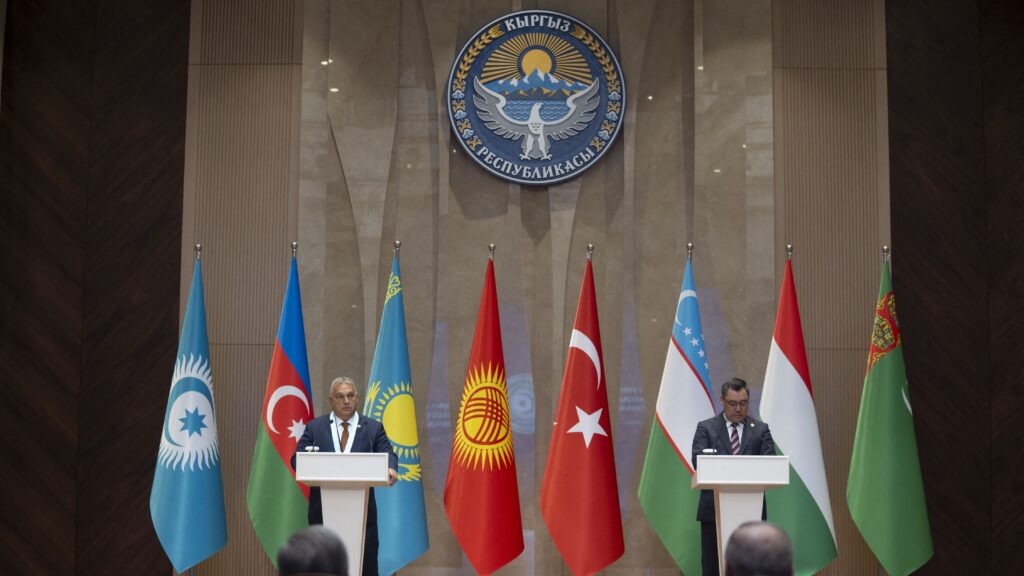Bernadett Petri, Ministerial Commissioner for the coordination of direct EU funds at the Hungarian Ministry of Public Administration and Regional Development, and Executive Director of the Hungarian Development Promotion Office (MFOI), was interviewed by Hungarian Conservative at the Art of Cooperation 2024 conference. The event, held in Budapest last week, explored the future, development, and significance of cross-border cooperation. The discussion with Petri centred on the prospects of EU regional policy and the priorities of the next EU long-term budget.
***
Today’s conference focuses on Interreg. What Interreg is and why preserving this form of funding is vital for the future of the European Union?
To begin addressing the issue, it is essential to understand how the European Union allocates its funds. There are resource allocations under cohesion policy and operational programmes, which are essentially distributed by Member States. These take geographical disparities into account, ensuring that less-developed regions receive greater financial support. On this basis, Hungary has also benefited from these funds, though they were partially suspended in the recent past. In addition to these, there are funds directly managed by Brussels, where the EU itself selects projects to support—these are referred to as EU programmes. Interreg, however, stands out as an interesting case because it occupies a middle ground. While certain elements are decided at the EU level, Member States enjoy significantly more freedom and influence in selecting territorial projects and deciding how to allocate funds. This structure is particularly desirable, as it grants Member States greater control over these resources. What is crucial about this event is its focus on the direction of the European Union budget. It goes beyond just Interreg to examine the proportions and purposes of the various funds being distributed. The EU is striving to establish itself as a global player, but despite good intentions, its actions can sometimes cause more harm than good for Member States. Our goal is to ensure that the allocation of resources is as efficient as possible, as one of the primary benefits of European integration lies in a shared EU budget. This is especially important considering that the EU itself has no independent financial resources and operates largely on contributions from Member States. Therefore, how these funds—essentially the money of Member States and their citizens—are spent is of significant importance.
What challenges could jeopardize EU regional policy in the upcoming budget cycle?
In the European Union, a new approach is emerging that would effectively dismantle the so-called regional policy, which aims to address disparities caused by geographical differences. Instead, Brussels is shifting its focus towards targets centred on social cohesion. The issue with this shift is that discussions around social matters are increasingly influenced by woke ideology, which risks politicizing aid distribution. We advocate for preserving regional policy in its current form, as it is the only programme that directly addresses geographical disparities, many of which stem from deep historical causes. Abandoning this approach would not only undermine the EU’s objectives but also harm those Member States still grappling with significant territorial inequalities.
Standing up against Brussels seems like a perfect job for Hungary…
Hungary has a clear interest in preserving the current system, ensuring that the principle of social cohesion does not replace the geographical approach. At the same time, it is crucial that cohesion funding does not evolve into a system akin to the reconstruction fund. The latter, having been designed as an emergency instrument during the coronavirus pandemic, revealed significant flaws in its milestone-based resource allocation mechanism. Under this system, funds are granted only when specific conditions are met, rather than when they are urgently needed for catching up.
‘We advocate for preserving regional policy in its current form, as it is the only programme that directly addresses geographical disparities’
This approach imposes a significant administrative burden on local communities and leads to excessively slow resource distribution. In the current geopolitical climate, the European Union’s ability to allocate resources swiftly and respond promptly to emerging challenges is of paramount importance. Thus, we firmly oppose any shift in resource allocation towards such a system or an exclusive focus on social objectives. Territorial disparities continue to affect citizens’ lives and addressing these disparities remains vital for achieving European prosperity—a fundamental goal of integration.
The process of enlargement has consistently influenced the allocation and distribution of funding within the EU. How might the current system adapt if, for instance, Ukraine were to join the integration?
If enlargement were to proceed, two areas would be significantly impacted: the Common Agricultural Policy, which would become nearly unsustainable under the current distribution system, and regional policy. Projections indicate that Hungary would likely become a net contributor in such a scenario. However, the core issue lies elsewhere. This year’s European Parliament elections and recent Member State elections reveal widespread dissatisfaction with current economic conditions. Citizens are eager to regain their economic stability and security. Achieving this requires the EU to ensure a level playing field that promotes the well-being of all its citizens—a goal incompatible with persistent territorial disparities. This remains the strongest argument for preserving regional policy.
‘If this trend persists, the EU risks losing its already diminishing influence on the global stage’
Thus, regardless of the pace of enlargement, two key considerations must be prioritized; first, the significance of the Western Balkans, which offers new markets, provides labour, and contributes to the EU’s economic recovery. Second, the necessity of attracting and securing additional resources to address existing funding gaps. Currently, Europe is falling behind in innovation, largely due to inefficiencies in the speed of funding mechanisms. If this trend persists, the EU risks losing its already diminishing influence on the global stage. Fortunately, there is still time to reconsider and prepare for the challenges ahead. The European Parliament is scheduled to discuss the new long-term budget between March and June, offering a critical opportunity for strategic adjustments.
Hungary appears prepared to stand its ground. What is the balance of power in this situation, and who stands on the opposing side?
This issue goes beyond a simple geographical confrontation between Western and Eastern Europe, although that dynamic remains significant. The more fiscally conservative countries naturally advocate for cuts in cohesion funding, but they are not necessarily the ones pushing for a shift towards social cohesion. That direction is more aligned with the progressive–liberal ideology, which is, in fact, a common political stance within the European Commission. Brussels often assumes it should dictate the challenges Member States face, but this approach is fundamentally flawed. Each country has its own unique problems and priorities that it seeks to address. This misalignment represents the greatest challenge in negotiations for the upcoming period: reconciling geographical disparities with political differences. Additionally, the outcome of the US elections cannot be overlooked in this context. The EU must reassess its competitiveness in the current global landscape. For Hungary, the election results are particularly significant and positive. However, Europe as a whole cannot afford to continue on a path of self-destruction. If the US prioritizes its own interests, which is understandable, the EU must adopt a similar stance. Should Brussels focus on advancing external economic agendas, Europe risks falling behind in the race for prosperity and progress.
Art of Cooperation – Interreg Networking Platform, 2024 November
Highlights of the Central and Eastern European, Baltic Interreg Programmes 2014-2020, 2021-2027 @szpihirlevel8459 #interreg #artofcoopereation #szpi #szechenyi #szechenyi programiroda #interregbaltic @ipaareeccdevinterregipacbc1975 @BSRprogramme @szpihirlevel8459
Related articles:








